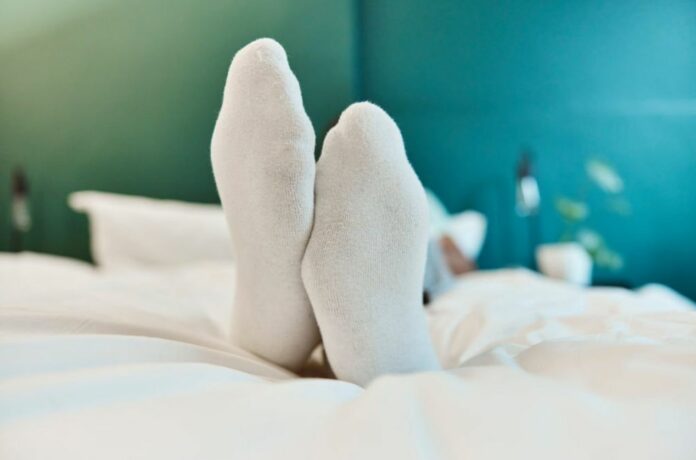How Socks Improve Sleep Quality – Jess Andrade, A doctor from Massachusetts Reveals
Lesser-Known Benefits: Why Sleeping in Socks Is Recommended
A medical professional from Massachusetts, Dr. Jess Andrade, went viral with a TikTok video explaining that night-time sock-wearing actually cools the body, contrary to the belief that it warms you.
Andrade demonstrates that although people generally wear socks to keep warm on chilly nights, the process of warming the feet helps the body attain a lower core temperature, facilitating better sleep.
Why does a cooler body aid in sleep? Dr. Jess elaborated that cooling the body is a signal to the brain that it’s bedtime, allowing those who wear socks to fall asleep quicker. As per Sleep.org, a decline in body temperature is related to feelings of sleepiness and preparation for sleep.
@doctorjesss I wear socks to bed so don’t come at me im not weird
♬ presleywalker – PresleyWalker
Socks May Enhance Intimacy
A 2005 study from the University of Groningen in the Netherlands unveiled that wearing socks might raise a couple’s likelihood of achieving orgasm by 50 to 80 percent. Though it had a small sample size, a 2021 re-examination by Shape magazine, along with other experts, supported the findings.
Hot Flashes? Socks Could Be the Solution
Many experts concur that wearing socks can stabilize your body’s core temperature. Therefore, it’s logical for them to suggest a dependable pair of socks, especially when there are fluctuations in your body temperature, akin to during hot flashes.
Hot flashes manifest as an abrupt sensation of heat on the face, neck, and chest, stemming from hormonal shifts during menopause. The precise cause of these shifts resulting in hot flashes remains a topic of research.
However, the Mayo Clinic theorizes that a decline in estrogen heightens the sensitivity of the body’s internal thermostat, the hypothalamus, to minor variations. If the hypothalamus perceives excessive warmth, it initiates a sequence of reactions, or flashes, to cool the body.
Sleep Quality Boosted by Socks
Wearing socks may be the remedy to bring consistency to a disrupted sleep pattern, especially during the deep REM phase. Research indicates that socks can expedite sleep onset, decrease nighttime disruptions, and prolong the duration of sleep.
A 2018 study in the Journal of Physiological Anthropology delved into the impact of feet warming by socks on sleep quality, especially in cooler surroundings.
To put it another way, the study aimed to uncover how the body reacts biologically to wearing socks during sleep. Even though the research was based on a limited group of adult males, the findings were evident: sleeping with socks enhanced both the sleep quality and overall performance of the participants. Interestingly, despite prevalent medical beliefs, the study found no substantial change in body temperature due to wearing socks.
Socks: A Simple Remedy for Rough Feet
Struggling with dry, cracked heels? Everyday Health mentions that such heels can lead to discomfort, bleeding, and even infections. Alan K. Mauser, DPM, a renowned podiatrist from Louisville, Kentucky, emphasizes the importance of foot hydration, recommending the consistent use of creams or chemical treatments to manage calluses.
When it comes to moisturizing, slipping on socks after applying cream can lock in the moisture. This not only softens your feet but also prevents the residue from a rich foot cream from staining your bed linens.
Socks Could Help with Insomnia
Revisiting the topic of circadian rhythms and the body’s internal temperature control, a 2010 research paper from Cancer Nursing highlights that warming the feet roughly 20 minutes prior to bedtime might alleviate symptoms of insomnia. If socks don’t seem to enhance your sleep quality, consider warming your hands before resting.
For those grappling with persistent insomnia or erratic sleep patterns, wearing socks could be beneficial. Although they’re not a cure-all or the sole remedy for insomnia, studies suggest that they can offer some comfort on those restless nights.
Picking the Perfect Sleeping Socks
While fluffy socks might be tempting, experts generally advocate for breathable fabrics like cashmere and wool as the optimal choices for nighttime wear, designed to help regulate body temperature.
In conclusion, this seemingly minor nightly habit of wearing socks can have significant impacts on various aspects of well-being, from sleep to intimacy. It’s more than a simple comfort measure; it’s a lifestyle choice backed by scientific research.
Image Credit: Shutterstock
